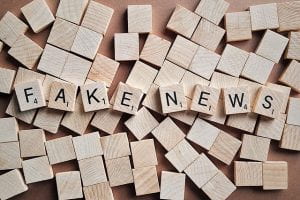
In my last blog this digital dinosaur mentioned the ease at which the internet, digital and social media a aka: “convergent media” allows anyone to search for information and how easy it is to post and publish any information at a drop of the hat.
You would think that all this information literally at our fingertips would have the potential to make us as a society more knowledgeable and informed. However, how can stakeholders distinguish between fake news and factual information that is impartial and not pushing a certain agenda?
Most people see news on their social media feeds and spend on average a mere 15 seconds on checking the source of the stories and many instead only read the headline!
https://www.ofcom.org.uk/about-ofcom/latest/features-and-news/half-of-people-get-news-from-social-media
The news that appears on such feeds is controlled by social media sites, and has to be liked to appear, so is this news that is really important for stakeholders to know, or are other members of society setting the agenda of what news reaches us because of the number of likes the article received?
With so little time spent on checking the facts and viability of the information, how can stakeholders be sure that the information presented is really impartial and factually correct? Can they really trust it? And how can companies be sure that the information they are publishing is being taken seriously, and seen on various digital channels, and is being taken on board in the way that they wish?
Has convergent media made us as society ever lazier, leading to the creation of mindless individuals who are unable to think for themselves unable to distinguish fact from fiction and form their own opinions based on factual research, rather than reading and taking on board the opinions and thoughts of others?
In fact, the issue of trust is a big one. Can you trust what you are reading? Is it factually correct or just false information? A team, led by Sinan Aral of the Massachusetts Institute of Technology, wrote in the journal Science, “Falsehood diffused significantly farther, faster, deeper, and more broadly than the truth in all categories of information, and the effects were more pronounced for false political news than for false news about terrorism, natural disasters, science, urban legends, or financial information,”
What is also concerning, is the power of social media to get people to act without thinking, resulting in a negative impact on reputation and company performance. For example, in 2016, case in point being a social media story attributed to Pepsi Co CEO Indra Nooyi denigrating Donald Trump’s supporters saying “they should take their business elsewhere” caused the company to lose 5.21% of its share price. This initially damaged Pepsi Cos reputation but had no substance and was in fact fake news
https://www.campaignlive.co.uk/article/fake-news-sites-spark-pepsi-boycott-brands-crosshairs/1416027
Luckily though there is some awareness beginning to emerge about whether you can trust the information on convergent media. In an internet survey carried out by the Centre for international governance innovation in 2019, on internet security and trust, they discovered that
– 75% reported social media companies as responsible for distrust on the internet
– 86% of respondents had fallen for fake new at least once
– Only 32% believe social media algorithms are unbiased
https://www.cigionline.org/internet-survey-2019?gclid=EAIaIQobChMIrbizs4HZ6QIV2evtCh0lWwC8EAAYASAAEgLk0_D_BwE
By the end of 2019 social media has 3.5 billion users worldwide and is still growing, though some western countries have stagnated for the main platforms there will still be growth for newer platforms such as TikTok. The increasing usage of these platforms to receive news will continue to enable the spread of fake news and propaganda, however as of April 2020 big platforms such as Facebook and Twitter have taken steps to limit the spread of news that is considered fake, which is a double-edged sword, simultaneously minimising the damage, but thus becoming the decision maker on what is seen.
https://www.bbc.co.uk/news/technology-52245992
How does this effect PR?
Well I think PR has its work cut out in building trust with its stakeholders. This really comes down to the code of conduct and the transparency and authenticity in which a company communicates towards its stakeholders and is perceived. Public Relations departments and company management have to now work even harder to distinguish facts from the fiction on social media. This presents more of a challenge in so many ways. More about this in one of my next blogs.
